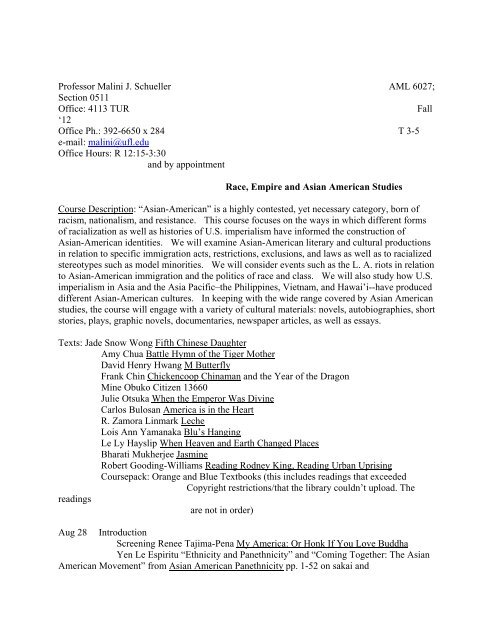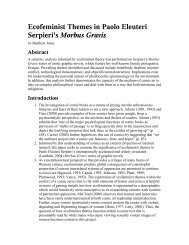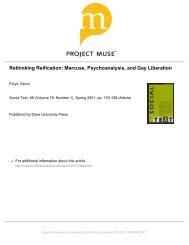Professor Malini J. Schueller AML 6027; Section 0511 Office: 4113 ...
Professor Malini J. Schueller AML 6027; Section 0511 Office: 4113 ...
Professor Malini J. Schueller AML 6027; Section 0511 Office: 4113 ...
You also want an ePaper? Increase the reach of your titles
YUMPU automatically turns print PDFs into web optimized ePapers that Google loves.
<strong>Professor</strong> <strong>Malini</strong> J. <strong>Schueller</strong> <strong>AML</strong> <strong>6027</strong>;<br />
<strong>Section</strong> <strong>0511</strong><br />
<strong>Office</strong>: <strong>4113</strong> TUR Fall<br />
‘12<br />
<strong>Office</strong> Ph.: 392-6650 x 284 T 3-5<br />
e-mail: malini@ufl.edu<br />
<strong>Office</strong> Hours: R 12:15-3:30<br />
and by appointment<br />
Race, Empire and Asian American Studies<br />
Course Description: “Asian-American” is a highly contested, yet necessary category, born of<br />
racism, nationalism, and resistance. This course focuses on the ways in which different forms<br />
of racialization as well as histories of U.S. imperialism have informed the construction of<br />
Asian-American identities. We will examine Asian-American literary and cultural productions<br />
in relation to specific immigration acts, restrictions, exclusions, and laws as well as to racialized<br />
stereotypes such as model minorities. We will consider events such as the L. A. riots in relation<br />
to Asian-American immigration and the politics of race and class. We will also study how U.S.<br />
imperialism in Asia and the Asia Pacific–the Philippines, Vietnam, and Hawai’i--have produced<br />
different Asian-American cultures. In keeping with the wide range covered by Asian American<br />
studies, the course will engage with a variety of cultural materials: novels, autobiographies, short<br />
stories, plays, graphic novels, documentaries, newspaper articles, as well as essays.<br />
Texts: Jade Snow Wong Fifth Chinese Daughter<br />
Amy Chua Battle Hymn of the Tiger Mother<br />
David Henry Hwang M Butterfly<br />
Frank Chin Chickencoop Chinaman and the Year of the Dragon<br />
Mine Obuko Citizen 13660<br />
Julie Otsuka When the Emperor Was Divine<br />
Carlos Bulosan America is in the Heart<br />
R. Zamora Linmark Leche<br />
Lois Ann Yamanaka Blu’s Hanging<br />
Le Ly Hayslip When Heaven and Earth Changed Places<br />
Bharati Mukherjee Jasmine<br />
Robert Gooding-Williams Reading Rodney King, Reading Urban Uprising<br />
Coursepack: Orange and Blue Textbooks (this includes readings that exceeded<br />
Copyright restrictions/that the library couldn’t upload. The<br />
readings<br />
are not in order)<br />
Aug 28 Introduction<br />
Screening Renee Tajima-Pena My America: Or Honk If You Love Buddha<br />
Yen Le Espiritu “Ethnicity and Panethnicity” and “Coming Together: The Asian<br />
American Movement” from Asian American Panethnicity pp. 1-52 on sakai and
Coursepack<br />
Racial Paradigms<br />
Sept 4 Henry Yu from Thinking Orientals, pp. 198-204 electronic reserve<br />
Michael Omi and Howard Winant, Racial Formation in the United States<br />
Pp.48-76 (1994 edition) Coursepack<br />
Suchen Chang “Hostility and Conflict” from Asian Americans: An Interpretive<br />
History pp. 45-61 electronic resesrve<br />
Frank Chin and Jeffrey Chan “Preface” to Aiieeeee vi-xvii electronic reserve<br />
Frank Chin and Jeffrey Chan “Racist Love” From Seeing Through Shuck, pp.<br />
65-72<br />
in Packet electronic reserve<br />
Lisa Lowe, “Heterogeneity, Hybridity, Multiplicity: Asian American<br />
Differences.” from Immigrant Acts pp. 60-83. Diaspora 1i (1991) 24-44 electronic<br />
reserve<br />
http://www.oah.org/pubs/magazine/deseg/source1.html Letter from Mary Tape to<br />
San<br />
Francisco School Board 1885<br />
Presentation: Omi and Winant Racial Formation in the United States<br />
The New Politics of Race<br />
Lisa Lowe Immigrant Acts<br />
Model Minorities<br />
Sept 11 Robert G. Lee “The Cold War Origins of the Model Minority Myth” from Orientals,<br />
pp. 145-160 electronic reserve<br />
Jade Snow Wong Fifth Chinese Daughter<br />
Sau Ling Cynthia Wong from Reading Asian American Literature pp. 55- 71 in<br />
Packet<br />
Wenying Xu From Eating Identities, pp. 8-16 electronic reserve<br />
Jinqui Ling “Hegemony: The Case of Jade Snow Wong” electronic reserve<br />
Frank Chin “Come All Ye Asian American Writers of the Real and the Fake”<br />
from The Big Aiiieeeee!, pp. 1-52 coursepack<br />
Frank Chin “Railroad Standard Time” electronic reserve<br />
Presentation: Wong Reading Asian American Literature<br />
Ling Narrating Nationalisms<br />
Xu Eating Identities<br />
Sept 18 Peterson “Success Story, Japanese-American Style.” New York Times Magazine,<br />
January 9, 1966. electronic reserve<br />
“Success Story of One Minority Group in the U.S” coursepack under Amy Tachiki<br />
Robert G. Lee from Orientals, pp. 180-191 coursepack<br />
Vijay Prashad from The Karma of Brown Folk vii-xi, 1-9 sakai<br />
Leslie Bow “Racial Interstitiality and the Anxieties of the ‘Partly Colored’:<br />
Representations of Asians under Jim Crow, ” Journal of Asian American Studies 10.1<br />
(February 2007): 1_30. Electronic Journal
eserve<br />
“The Rise of Asian Americans” Pew Research Center<br />
http://www.pewsocialtrends.org/2012/06/19/the_rise_of_asian_americans/<br />
Amy Chua Battle Hymn of the Tiger Mother<br />
Elsa Davidson, “Tiger Mother Anxiety” Anthropology Now 3 iii (2011) 115-121<br />
Electronic<br />
Presentation: Lee Orientals<br />
Prashad Karma of Brown Folk<br />
Orientalism<br />
Sept 25 Edward Said “Imaginative Geography and Its Representations” Orientalism 49-73<br />
Electronic reserve<br />
David Henry Hwang M Butterfly<br />
Jonathan Wisenthal “Inventing the Orient” From A Vision of the Orient, pp. 3-20<br />
Electronic resesrve<br />
Judith Butler “Imitation and Gender Insubordination” from Diana Fuss Inside/Out<br />
Electronic reserve<br />
Sheng Mei Ma from The Deathly Embrace pp. xi-xxiii Electronic reserve<br />
Karen Kelsky, From Women on the Verge, pp. 17-26; 174-177 Coursepack<br />
Presentation: Ma The Deathly Embrace<br />
Said Orientalism<br />
Blackness and Asian American Identity<br />
Oct 2 Maeda, Daryl J. “Black Panthers, Red Guards, and Chinamen: Constructing Asian<br />
American Identity through Performing Blackness, 1969_1972" American Quarterly _<br />
Volume 57, Number 4, December 2005, pp. 1079_1103 Electronic Reserve<br />
Frank Chin Chickencoop Chinaman<br />
Diane Fujino essay about Aoki and Kochiyama from Afro Asia Coursepack<br />
Thien-bao Thuc Phi “Yellow Lines: Asian Americans and Hip Hop” From Afro Asia<br />
Ed. Fred Ho and Bill v. Mullen pp. 295-317 Coursepack<br />
Jachinson Chan “American Inheritance: Chinese American Male Identities 2-25 From<br />
Chinese American Masculinities Electronic reserve<br />
Presentation: Chan Chinese American Masculinities<br />
Exclusion and Identity: Internment<br />
Oct 9 Haney Lopez from White By Law pp. 37-47, 217-225 Electronic reserve<br />
Ronald Takaki “The Myth of ‘Military Necessity’for Japanese_American Internment”<br />
From Strangers From a Different Shore, pp. 379-405. Electronic reserve
Don T. Nakanishi “Surviving Democracy’s ‘Mistake’:Japanese Americans & The<br />
Enduring Legacy of Executive Order 9066" Amerasia Journal 19 i (1993), 7-35<br />
Electronic reserve<br />
From Richard Drinnon, Keeper of Concentration Camps, pp. 39-49 Electronic reserve<br />
Mine Obuko Citizen 13660<br />
James Scott From Weapons of the Weak, pp. 314-340 Electronic reserve<br />
Presentation: Lopez White By Law<br />
Scott Weapons of the Weak<br />
Abstracts of Final Paper Due<br />
Oct 16 Julie Otsuka When the Emperor Was Divine<br />
Hisaye Yamamoto “The Legend of Miss Sasagawara”<br />
King Kok Cheung from Articulate Silences, pp. 1-26 Electronic reserve<br />
Tina Chen “Toward an Ethic of Knowledge” MELUS 2005 Summer; 30 (2): 157_73<br />
ER<br />
Rajini Srikanth From Constructing the Enemy, pp. 1-18. Electronic Book<br />
Two interesting texts about Topaz and/Heart Mountain from densho.org for discussion<br />
Presentation: Texts about a particular camp from densho.org<br />
The L.A. Riots and Korean-America<br />
Oct 23 Michael Omi and Howard Winant “The Los Angeles ‘Race Riot’ and Contemporary<br />
U.S. Politics” from Reading Rodney King, 97-116<br />
Elaine Kim “Home is Where the Han Is...” from Reading Rodney King, pp.<br />
215-236<br />
Screening Sa-I-Gu<br />
Sumi K. Cho “Korean Americans vs. African Americans: Conflict and Construction”<br />
from Reading Rodney King, pp. 196-207<br />
K.W.Lee “Legacy of Sa-i-gu: Goodbye Hahn, Good Morning, Community<br />
Conscience” Amerasia Journal 38 i (2012), 91-112 Electronic reserve<br />
Ikemoto, Lisa C. "Traces of the Master Narrative in the Story of African<br />
American/Korean American Conflict: How We Constructed 'Los Angeles.'" Southern<br />
California Law Review 66 (1993): 1581_1598. Electronic reserve<br />
Ty Pak “The Court Interpreter” from Moonbay, pp. 87-118 Coursepack<br />
Screening Sa-I-Gu<br />
Empire and Asian America<br />
Oct 30 Oscar V. Campomanes “New Formations of Asian American Studies and the Question<br />
of U.S. Imperialism” Positions 5 ii (Fall 1997), 523-550. Electronic reserve<br />
Victor Bascara from Model-Minority Imperialism pp.49-52 Electronic reserve<br />
The Philippines
Ronald Takaki from Strangers from a Different Shore 315-335 coursepack<br />
From E. San Juan The Philippine Temptation. pp. 88-94 electronic reserve<br />
George F. Becker “Are the Philippines Worth Having?” electronic reserve<br />
Susan Koshy from Sexual Naturalization, 91-105 electronic reserve<br />
Carlos Bulosan America is in the Heart<br />
Presentation: Bascara Model-Minority Imperialism<br />
Koshy Sexual Naturalization<br />
Nov 6 Renato Constantino The Miseducation of the Filipino coursepack<br />
“Re-placing Language: textual strategies in post-colonial writing” From Bill<br />
Ashcroft et. als The Empire Writes Back, pp. 38-77. coursepack<br />
Vicente Rafael “The Undead: Notes on Photography in the Philippines” From<br />
White Love, pp. 76-102. Electronic reserve<br />
R. Zamora Linmark Leche<br />
Presentation: Ashcroft The Empire Writes Back<br />
Rafael White Love<br />
Hawai’i: Settler Colonialism and Asian America<br />
Nov 13 Haunani Kay Trask from From A Native Daughter, pp. 1-21; 136-147 Electronic Book<br />
Jane Desmond from Staging Tourism Electronic reserve<br />
Lois Ann Yamanaka Blu’s Hanging<br />
Candace Fujikane “Sweeping Racism Under the Rug of Censorship. . .” Electronic<br />
reserve<br />
Emily Russell “Locating Cure: Leprosy and Lois Ann Yamanaka’s Blu’s Hanging”<br />
MELUS 31 i (Spring 2006), 53-80. Electronic reserve<br />
Haunani Kay-Trask “Settlers of Color and ‘Immigrant’ Hegemony” Electronic<br />
reserve<br />
Hau‘ofa, “Our Sea of Islands” Electronic reserve<br />
Presentation: Kay-Trask From a Native Daughter<br />
Desmond Staging Tourism<br />
Vietnam: The Politics of Representation and Reconciliation<br />
Nov 20 Anne McClintock from Imperial Leather pp. 352-360. Electronic reserve<br />
Le Ly Hayslip When Heaven and Earth Changed Places<br />
Leslie Bow “Third World Testimony in the Era of Globalization: Le Ly Hayslip’s<br />
Bad (Girl) Karma and the Art of Neutrality” From Betrayal and Other Acts of<br />
Subversion, pp. 115-136 Electronic reserve<br />
Viet Thanh Nguyen From Race and Resistance, pp. 3-31 Coursepack<br />
Presentation: Bow Betrayal and Other Acts of Subversion<br />
Nguyen Race and Resistance<br />
Globalization, Immigration and Race
Nov 27 Pheng Cheah “Introduction Part II: The Cosmopolitcal--Today” From Cosmopolitics<br />
Electronic reserve<br />
Arjun Appadurai “Disjuncture and Difference in the Global Cultural Economy”<br />
from<br />
Modernity at Large, pp. 27-47, 201. Electronic reserve<br />
Bharati Mukherjee Jasmine<br />
Anthony C. Alessandrini “Reading Bharati Mukherjee, Reading Globalization”<br />
from<br />
World Bank Literature, pp. 265-279. Electronic reserve<br />
Dec 4 Ten minute presentations on papers or work on papers<br />
Dec 7: Final papers due in my mailbox by 4 pm<br />
Course Requirements and Grade Distribution<br />
Weekly position papers on the readings due during class (around 2 pages): 15%<br />
These should be critical and evaluative rather than summations of the readings. Raise questions<br />
here but be specific and try to link together some readings. You need to turn in a total of 10<br />
response papers but you may turn in more if you wish. I’m happy to read more. Please do not<br />
turn in these papers late because we’ll be discussing them in class.<br />
Two Oral presentations: 20%<br />
Presentations: The presentations in this class are intended to broaden your knowledge of critical<br />
issues in Asian American literature and culture. You need to do two presentations, one on a<br />
critical text and one on a literary/cultural text. For the presentation on a critical text, give<br />
students a brief synopsis of the critical work and the thesis of the work. Then present your<br />
critique of the work ie demonstrate its significance, the validity of its arguments, the strengths<br />
and/weaknesses of its arguments. A one page handout with the thesis and synopsis is required.<br />
For the presentation on a literary/cultural work, do a close reading of one or two passages and<br />
show how these are central to the text as a whole. Please practice your presentation ahead of<br />
time so that you use class time effectively.<br />
If you have an idea for a presentation different from the above, please come and see me or bring<br />
up the discussion in class. I’m open to all kinds of topics as long as they connect well with the<br />
readings.<br />
By all means, use material from the presentation for your final paper.<br />
Final paper (20 pages): 65%<br />
These should be analytical papers about 20 pages in length (excluding Notes and Bibliography).<br />
They may be extensions of the work you’ve done for the presentation or entirely new papers.<br />
Whatever option you choose, you need to do a complete MLA search on your subject and<br />
incorporate the research into your paper. Be sure that your papers have a theoretical angle so that<br />
the argument you make is significant not only because of the specific works you are considering
ut also to an interpretation of certain cultural issues. Connect your critical angle to current<br />
scholarship on the subject.<br />
By all means, use material from the presentation for your final paper.<br />
As part of the requirements for the paper you need to :<br />
1. Find conference with a Spring deadline for the CFP.<br />
2. Write the required abstract for the conference, as well as the letter of submission.<br />
If you are a Ph.D. student, I strongly urge you to think about your paper as a possible<br />
publication. You will need to look at some journal issues in order to see how you need to frame<br />
your argument.<br />
Attendance<br />
It is understood that graduate students do not skip class. Please remember that this is an<br />
intensive discussion class and part of the work of the class is building up a series of discussions<br />
which we continue to build upon in the course of the semester. Because your participation is<br />
central to these discussions, you are expected to read all materials carefully and attend every<br />
meeting. If you are presenting a paper at a conference and have a conflict with ONE weekly<br />
meeting, please see me. There will be a grade penalty for missed classes.<br />
Reading Materials<br />
Your are required to read all assigned material and bring the readings to class. Many of your<br />
readings are available via electronic reserve. If you are off campus, access the readings from<br />
the UF VPN service for which there is a link on the library homepage Some are in the<br />
coursepack and one is on sakai. I have marked them accordingly on the syllabus. Please give<br />
yourself enough time to download them and, if possible, print them, and bring the printed<br />
versions to class.
Reserve Book List<br />
Victor Bascara Model Minority Imperialism Minnesota 2006<br />
Leslie Bow Betrayal and Other Acts of Subversion. Princeton, 2001<br />
Jachinson Chan Chinese American Masculinities: From Fu Manchu to Bruce Lee.Routledge 2001<br />
Ed. Frank Chin et als. Aiiieeeee: An Anthology of Asian-American Writers. Howard UP, 1974<br />
Frank Chin Chickencoop Chinaman and The Year of the Dragon 1982<br />
Ed. Jeffrey Chan, et als The Big Aiiieeeee 1991<br />
Jachinson Chan Chinese American Masculinities: From Fu Manchu to Bruce Lee. Routledge<br />
2001<br />
Pheng Cheah and Bruce Robbins Cosmopolitics: Thinking and Feeling Beyond the Nation 1998<br />
Anne McClintock Imperial Leather: Race, Gender, and Sexuality in the Colonial Context. 1995<br />
Haunani Kay-Trask From a Native Daughter: Colonialism and Sovereignty in Hawai’i. 1999<br />
King Kok Cheung Articulate Silences 1993<br />
Renato Constantino The Miseducation of the Filipino 1982<br />
Patricia Chu Assimilating Asians: Gendered Strategies of Authorship in Asian America.<br />
Duke 2000.<br />
David. L. Eng Racial Castration: Managing Masculinity in Asian America. Duke 2001<br />
Diana Fuss Inside/Out: Lesbian Theories, Gay Theories. Routledge 1991<br />
Yen Le Espiritu Asian-American Panethnicity. Temple, 1992<br />
Ed. Jessica Hagedorn Charlie Chan is Dead: An Anthology of Contemporary Asian American<br />
Fiction. Penguin, 1993<br />
Elaine Kim Asian American Literature: An Introduction to their Writings and Their Social<br />
Context Temple UP, 1982<br />
Susan Koshy Sexual Naturalization: Asian Americans and Miscegenation Stanford 2005<br />
Rachel Lee The Americas of Asian American Literature: Gendered Fictions of Nation and<br />
Transnation. Princeton, 1999<br />
Ed. Rachel Lee Asian America.net: Ethnicity, Nationalism, and Cyberspace 2003<br />
*Robert G. Lee Orientals; Asian Americans in Popular Culture Temple, 1999<br />
Jinqui Ling Narrating Nationalims: Ideology and form in Asian American Literature, 1998<br />
Ian Haney Lopez White By Law 1996<br />
Lisa Lowe Immigrant Acts: On Asian American Cultural Politics. Duke 1996<br />
Sheng Mei-Ma The Deathly Embrace: Orientalism and Asian American Identity 2000<br />
Viet Thang Nguyen Race and Resistance: Literature and Politics in Asian America 2002<br />
Vijay Prashad The Karma of Brown Folk 2001<br />
Michael Omi and Howard Winant Racial Formation in the United States 1994<br />
Vicente Rafael White Love and Other Events in Filipino History 2000<br />
Edward Said Orientalism. New York: Random House, 1978.<br />
James Scott Weapons of the Weak: Everyday Forms of Peasant Resistance 1987<br />
Ronald Takaki Strangers From a Different Shore: A History of Asian Americans 1998<br />
Sheng Mei-Ma The Deathly Embrace: Orientalism and Asian American Identity. Minnesota 2000<br />
Sau-Ling Cynthia Wong Reading Asian American Literature: From Necessity to Extravagance<br />
1993<br />
Henry Yu Thinking Orientals: Migration, Contact, and Exoticism in Modern America 2002<br />
Wenying Xu Eating Identities: Reading Food in Asian American Literature. 2007




